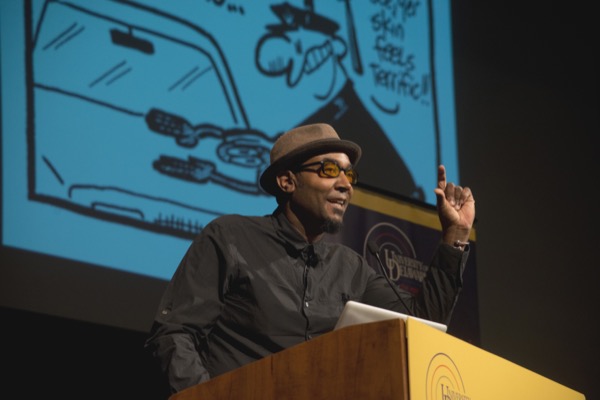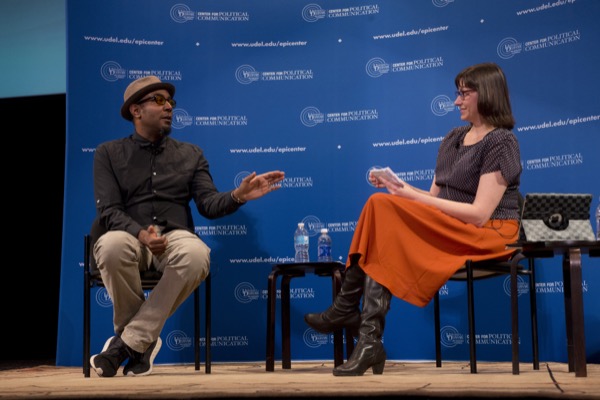Conversations on race vital
Cartoonist Keith Knight discusses art, race relations in National Agenda talk
2:50 p.m., Nov. 5, 2015--Cartoonist Keith Knight believes that black lives do matter and that the time has come for a change in the way law enforcement and the criminal justice system treat black youths.
The noted creator of popular comic strips the Knight Life, (th)ink and the K Chronicles, Knight discussed these issues during a University of Delaware National Agenda presentation held Wednesday, Nov. 4, in Mitchell Hall.
People Stories
'Resilience Engineering'
Reviresco June run
Knight’s talk, “They Shoot Black People, Don’t They,” was the latest presentation in the National Agenda series on “Race in America: Conversations about Identity and Equality.”
At first, Knight noted, he only was asked to discuss his art during Black History Month presentations traditionally held nationwide each year in February.
“I would get up early, wait to get the check and then cash the check,” Knight said. ”Then, I started writing back and telling people that I work the other 11 months of the year, too.”
Knight began drawing his cartoons, which often deal with race-related events drawn from local and national news media, because he wasn’t seeing himself in the comics.
Once his work became available to readers, it wasn’t long before he became convinced that his message was resonating with all kinds of audiences.
“I would get one from someone who wrote that he was a 53-year-old white male who said, ‘I can’t believe that that you do my favorite comic strip,’” Knight said. “You can relate to someone who doesn’t look like you.”
Knight showed a cartoon from (th)ink that features three guys watching the television set in a bar, with the top caption reading: “This just in: Police have just released the description of the alleged gunman who has been terrorizing the downtown area…”
At the bar, the black man says, “Please don’t let it be a black guy.” The next man says, “Please don’t let it be a Middle Eastern guy.” And the white man says, “Ha!! They’ll never catch me!!” The tag line reads: “Ahh … the power of white privilege.”
“I’m proud of my race strips,” Knight said. “They cause us to have a conversation about white privilege.”
Knight, who started doing a daily comic strip in 2008, said he gets a lot of emails and other replies and likes seeing just how smart and intelligent his audience really is.
He also recalled how one of the common situations in which young black males find themselves in confrontations with law enforcement officers actually happened to him in real life.
“It was 1999, and I was standing at my local bus stop in my neighborhood, and I was hanging up posters for my rap band, Marginal Prophets, and a police car came speeding down the hill. A cop jumps out and says, ‘What are you doing here?’” Knight said. “Then he starts getting on his radio. I ask him what this is about. He says, ‘We got a report that someone is robbing houses in your neighborhood, and you fit the description.’”
The description of the suspect was simply a six-foot-tall black male.
As more police officers arrived on the scene, Knight recalled saying to himself, “This is just the thing that’s been happening that I have been writing about. And it’s happening to me right now.”
Knight said that while four officers were standing around him, his white roommate came charging across the street and ran up to them.
“He was red-faced and screaming bloody hell,” Knight said. “Right there, right then, I saw what white privilege was, because the cops turned around and said, ‘It’s OK man. It’s cool. Take it easy. If he had been a black man or a person of color, he would have been tazed or beaten.”
A big part of the problem, Knight said, is America’s war on drugs.
“This basically is a vestige of the old Jim Crow laws, and just another way to put black men in prison,” Knight said. “When you put a black man in prison, he’s done.”
Today white families are beginning to ask question about the war on drugs because their children have been having problems with heroin, Knight said, adding, “It took something like this to get the conversation started.”
During the question and answer session moderated by Lindsay Hoffman, director of the series and associate director of UD’s Center for Political Communication, Knight noted that while not all his cartoons are meant to be funny, they do mirror the need for a national discussion on a wide variety of race-related issues.
The conversation about race is not going to be easy, Knight said. "It's not going to be comfortable, but we have to have that conversation."
About the series
The 2015 National Agenda series includes six speakers and four films designed to stimulate conversations about equality and identity, all scheduled at 7:30 p.m. on Wednesdays in Mitchell Hall on the UD campus in Newark. Presentations are free and open to the public.
The director of the series is Lindsay Hoffman, associate director of UD's Center for Political Communication.
National Agenda includes both speakers and films. The next film screening will feature The People’s Report, and a question-and-answer session with the director, Yasser Arafat Payne, UD associate professor in the Department of Black American Studies, on Nov. 11.
The final speaker in the series will be Redditt Hudson, former St. Louis police officer and co-founder of the National Coalition of Law Enforcement for Justice, Reform and Accountability, on Nov. 18.
National Agenda is supported by the College of Arts and Sciences, the Office of the Provost, the Center for the Study of Diversity and the William P. Frank Foundation of Delaware.












